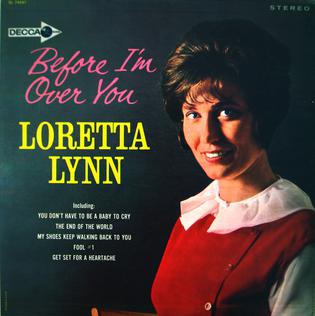
Before I'm Over You is a studio album by American country singer-songwriter Loretta Lynn. It was released on June 22, 1964 via Decca Records and was produced by Owen Bradley. It was Lynn's second studio album issued in her recording career and contained a total of 12 tracks. Two songs from the record were released as a singles and became major hits on the Billboard country chart: the title track and "Wine, Women and Song." The album received positive reception from music publications after its release.

Mr. and Mrs. Used to Be is the first collaborative studio album by American country music singers Ernest Tubb and Loretta Lynn. It was released on August 2, 1965, by Decca Records.

Songs from My Heart.... is a studio album by American country singer-songwriter Loretta Lynn. It was released on February 15, 1965 via Decca Records and was produced by Owen Bradley. It was Lynn's third studio album released in her career and contained a total of 12 tracks. The album charted on the Billboard albums chart following its release and contained one single. The song, "Happy Birthday" became a major hit on the Billboard country chart in 1965.

Don't Come Home a Drinkin' (With Lovin' on Your Mind) is the ninth solo studio album by American country music singer-songwriter Loretta Lynn. It was released on February 6, 1967, by Decca Records.
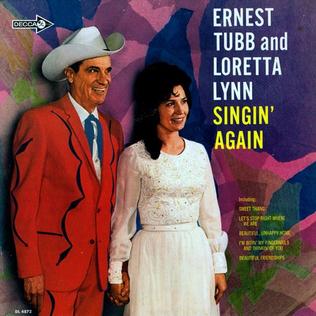
Singin' Again is the second collaborative studio album by American country music singers Ernest Tubb and Loretta Lynn. It was released on May 29, 1967, by Decca Records.

"Wish I Didn't Have to Miss You" is a song written by Hank Cochran and Dave Kirby. It was originally and released as a duet by American country music artists Jack Greene and Jeannie Seely. Released as a single in October 1969, the song became a number two song on the US country chart in early 1970. The song was given positive reviews from Billboard and Cash Box magazines and would influence the making of their debut studio album in 1970.
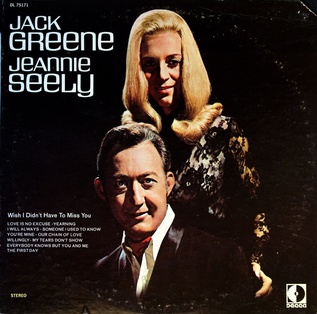
Jack Greene, Jeannie Seely is a studio album by American country music artists Jack Greene and Jeannie Seely. It was released by Decca Records in January 1970 and contained 11 tracks of mostly cover tunes. Although already both having two separate successful country recording careers, Greene and Seely teamed up to record an album of duets following the success of their single "Wish I Didn't Have to Miss You", which is also included. The LP received positive reviews from Billboard, Cash Box and Record World magazines.

Two for the Show is a studio album by American country music artists Jack Greene and Jeannie Seely. It was released in January 1973, by Decca Records. It was pair's second studio album as a duet team. The album included two singles that reached the US and Canadian country songs top 20 between 1971 and 1973: "Much Oblige" and "What in the World Has Gone Wrong with Our Love". The latter was co-written by Hank Cochran, who contributed to four additional tracks on the album. Two for the Show also made the US country albums top 40.

The discography of American country artist Jack Greene contains 24 studio albums, one live album, four compilation albums, 40 singles and five other charted songs. He gained national attention as a drummer and background vocalist in Ernest Tubb's band. He soon signed a recording contract with Decca Records. Greene's second single, "Ever Since My Baby Went Away", became his first song to chart, reaching number 37 on the Billboard Hot Country Singles chart. Greene's next single, "There Goes My Everything", reached number 1 on the Billboard country chart in December 1966. Becoming his biggest hit, the song also was his only single to reach the Billboard Hot 100, peaking at number 65.
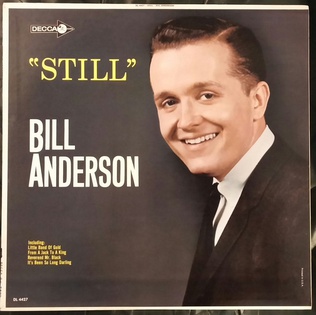
Still is a studio album by American country singer-songwriter Bill Anderson. It was released on June 17, 1963 on Decca Records and was produced by Owen Bradley. Still was Anderson's debut studio album as a recording artist after recording several singles for the Decca label. Two singles were included in the album. Its most successful was the title track, which became a crossover hit in 1963. It reached positions on the Billboard country, pop and adult contemporary charts. The album itself would also reach peak position on Billboard charts.

Bright Lights and Country Music is a studio album by Bill Anderson and the Po' Boys. It was released in November 1965 on Decca Records and was produced by Owen Bradley. It was Anderson's first studio album to include dual credit with his band, The Po' Boys. It was his fourth studio album overall. The album included one single release, the title track. This song became a major hit on the Billboard country charts. The album itself also reached charting positions on Billboard shortly after its release.

I Love You Drops is a studio album by American country singer-songwriter Bill Anderson. It was released in August 1966 on Decca Records and was produced by Owen Bradley. It was Anderson's fifth studio release and included three singles that became major hits on the Billboard country chart. The album would also become a success on the Billboard country albums list upon its release, becoming one of his most successful charting albums.

Get While the Gettin's Good is a studio album by American country singer-songwriter Bill Anderson. It was released in February 1967 on Decca Records and was produced by Owen Bradley. The project was Anderson's sixth studio album and included one single issued. The album itself reached peak positions on the Billboard country albums chart.

Wild Weekend is a studio album by American country singer-songwriter Bill Anderson. It was released in May 1968 on Decca Records and was produced by Owen Bradley. The record was Anderson's ninth studio release to be issued during his recording career. It reached peak positions on the Billboard country albums chart and also produced two singles that became major hits.
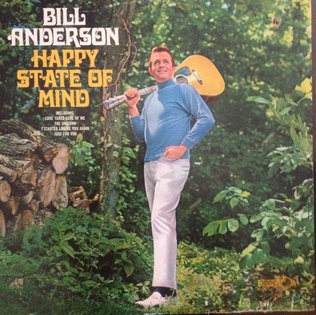
Happy State of Mind is a studio album by American country singer-songwriter Bill Anderson. It was released in September 1968 on Decca Records and was produced by Owen Bradley. Anderson's tenth studio recording, it was also his second studio album released in 1968. Among the songs included on the release was the title track, which became a major hit in both the United States and Canada.

My Life/But You Know I Love You is a studio album by American country singer-songwriter Bill Anderson. It was released in June 1969 on Decca Records and was produced by Owen Bradley. It was Anderson's eleventh studio album to be issued during his musical career. The album's title combines the names of its two singles. Both singles became major hits on the Billboard country chart.
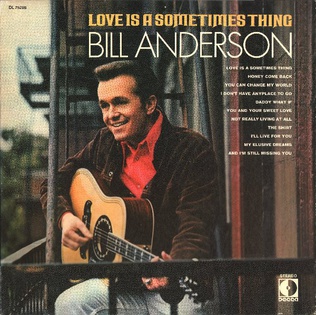
Love Is a Sometimes Thing is a studio album by American country singer-songwriter Bill Anderson. It was released in June 1970 on Decca Records and was produced by Owen Bradley. It was Anderson's fourteenth studio album since signing with the Decca label in 1958. Its only single, the title track, would become a major hit on the Billboard country chart in 1970. The album itself would also reach peak positions on the country albums chart following its release.
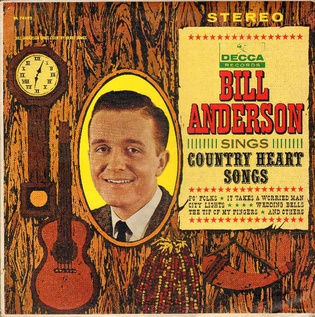
Bill Anderson Sings Country Heart Songs is a compilation album by American country singer-songwriter Bill Anderson. It was released in January 1962 on Decca Records and was produced by Owen Bradley. Despite it being a compilation, the project was Anderson's debut album release as a recording artist. It featured several of his early hits with the Decca label and included one song that would later be issued as a single in 1962.

From This Pen is a compilation album by American country music singer-songwriter Bill Anderson. It was released in June 1965 via Decca Records in several sessions produced by Owen Bradley. It was Anderson's second compilation released during his career and contained songs that he had recorded since his signing with the label. Many of the songs featured were major hits for Anderson in preceding years.
"Sweet Thang" is a song written and originally recorded by American country artist Nat Stuckey. It was Stuckey's first major hit as a music artist, peaking in the top ten of the national country music charts. In later years, it would notably be recorded by Ernest Tubb and Loretta Lynn.



















